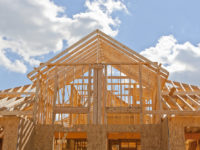WASHINGTON (AP) — Builders broke ground on the most new homes in nine years last month, a response to strong demand that should lift the economy.
Home construction soared 25.5 percent to a seasonally adjusted 1.3 million in October, the Commerce Department said Thursday . That is the biggest gain since July 1982. New construction is also at the highest level since August 2007, months before the Great Recession began.
Americans are clamoring to buy homes, but there are few properties on the market. That has driven up prices. Mortgage rates remain low, despite a big increase this week, making more homes affordable.
Steady hiring and some signs that pay gains are picking up have bolstered demand for housing. Younger Americans, buoyed by higher pay, are moving out on their own, renting apartments or seeking to buy houses. Sales of new and existing homes have picked up in recent months.
“With improved employment and income prospects, millennials are an expanding portion of housing demand, as they move out of their parents’ homes,” David Berson, chief economist at Nationwide, said.
The jump in construction was driven by a 75 percent leap in apartment building, a notoriously volatile category. That was the biggest gain in five years. Single-family home construction rose 10.7 percent.
Still, the future is a bit cloudy for housing. Donald Trump’s victory in the presidential election has led to higher interest rates on government bonds, a sign investors expect higher inflation in the coming years. Those increases have lifted mortgage rates from very low levels.
The average rate nationwide on a 30-year fixed mortgage jumped to 3.94 percent this week, from just 3.57 percent last week.
Trump’s policies could affect housing in different ways. Restrictions on immigration could limit the supply of available workers for construction firms, which have already complained for years of labor shortages.
Yet Ralph McLaughlin, chief economist at data provider Trulia, points out that Trump could loosen regulations on banks and reform mortgage giants Freddie Mac and Fannie Mae, potentially increasing the flow of mortgage lending.
Sales of new homes climbed 13 percent in September from a year earlier. Yet the supply of new properties was equivalent to just 4.8 months of sales, down from 5.8 months a year ago.
And sales of existing homes bumped up 3.2 percent in September from the previous month. But supply is tight there as well: The number of existing homes for sale was barely above 2 million, 6.8 percent lower than a year earlier.
Those shortages are likely fueling more construction. Homebuilding rose strongly last month in the Northeast, where new construction has lagged for months and is up just 2.2 percent in the past year. The increase was also strong in the Midwest, followed by steady gains in the West and South.
Applications for building permits, a good sign of future activity, barely rose to 1.23 million, the highest in a year. Still, that followed a much larger 6.3 percent gain in the previous month.
Employers are adding an average of about 175,000 jobs a month, and the unemployment rate fell to a low 4.9 percent in October. Average hourly pay rose in the past year by the fastest pace since before the recession began, boosting the confidence of would-be buyers.



Comment (0)